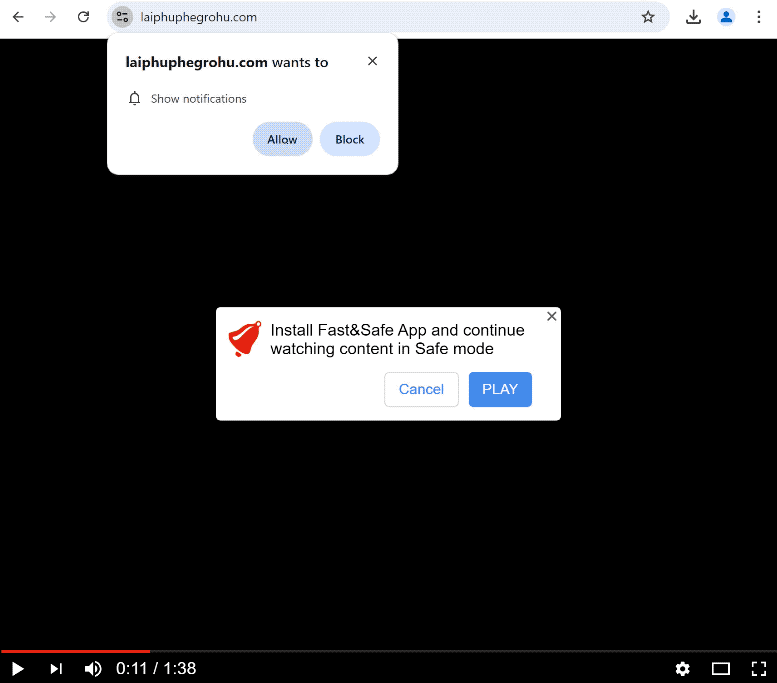Remove laiphuphegrohu.com notifications
laiphuphegrohu.com is a deceptive website that promotes scams and tries to trick users into allowing ads on their desktops. It does that by misusing a legitimate browser feature, which is why you will see a browser alert saying “laiphuphegrohu.com wants to show notifications” when you get redirected to the site. Do not allow notifications because you will be spammed with ads.
When you find yourself redirected to laiphuphegrohu.com, you will see a notification saying you need to install something called “Fast&Safe App” to continue watching. There will also be a fake video player in the background. Your browser will show an alert saying “laiphuphegrohu.com wants to show notifications”. If you click “Allow”, you will allow the site to spam ads on your desktop. The ads will appear in notification form on your desktop’s right side. They may be made to look like legitimate notifications to trick users into interacting with them. Do not interact with the notifications because you could be exposed to dangerous content, including scams and malware.
The “show notifications” feature itself is a legitimate feature that allows sites to show users notifications. However, it is often exploited by less trustworthy sites like laiphuphegrohu.com. When used appropriately, notifications can allow users to receive content more conveniently. For instance, if there’s a reputable news site that you frequent, permitting that site to send you notifications can keep you updated on the latest articles, allowing you to access content much more conveniently. Clicking on the notifications would redirect you to the specific news article.
If you’ve unwittingly given permission to laiphuphegrohu.com to display notifications, you can easily revoke this permission through your browser’s settings. If you need assistance, you can use the instructions provided at the end of the report.
What triggers redirects to sites like laiphuphegrohu.com?
Users often find themselves redirected to websites like laiphuphegrohu.com when browsing high-risk sites without an ad blocker. Many of these sites, especially those hosting adult or pirated content, are prone to exposing visitors to dubious content through ads. The good news is that a reliable adblocker program can effectively prevent these redirects and block unwanted ads.
Frequent redirects and an increase in ads can also indicate an adware infection on your computer. While adware can be very irritating, it’s generally not a serious threat. Adware and browser hijackers typically infiltrate users’ systems through a method known as software bundling. This method allows these unwanted programs to be installed without explicit permission. The way this works is the offers are added to popular free programs as extra offers. While these additional offers are technically optional, they need to be manually deselected. What’s more, they are hidden in settings that users don’t usually use, making them easy to overlook. This is why software bundling is a rather controversial installation method, and programs that use it are generally detected as potential threats.
However, preventing these unwanted installations is not difficult if you pay attention when installing programs and choose the correct settings. During the installation process, the installation window will recommend you use Default settings. However, choosing these settings will allow all bundled offers to be installed automatically. Instead, opt for Advanced settings, which make all additional offers visible and allow you to deselect the offers you don’t want. All you need to do is uncheck the boxes of those offers. Allowing any of them to install will result in your computer becoming cluttered with junk programs that may be challenging to remove later.
How to stop laiphuphegrohu.com notifications?
We strongly recommend you scan your computer with the anti-virus program WiperSoft to check for an adware infection. If adware is behind the redirects, using an anti-virus program to get rid of it would be easiest. Once the adware is gone, the redirects will stop. You also need to install a good adblocker program to block random redirects and intrusive ads, especially when browsing high-risk sites.
If you have given the site permission to show you notifications, you need to revoke it. This is easily done in your browser’s settings. You can find instructions below if you need assistance. If you don’t want to get notification requests, you can turn them off altogether.
- For Mozilla Firefox: Open Menu (the three bars top-right corner) -> Options -> Privacy & Security. Scroll down to Permissions, press Settings next to Notifications, and remove laiphuphegrohu.com and any other questionable websites. You can permanently turn off these notification requests by checking the “Block new requests asking to allow notifications” box in the same Notifications settings.
- For Google Chrome: Open Menu (the three dots top-right corner) -> Settings -> Privacy and security -> Site Settings. Click on Notifications under Permissions, and remove laiphuphegrohu.com and any other questionable websites. You can stop these notification requests permanently by toggling off “Sites can ask to send notifications”.
- For Microsoft Edge: Open Menu (the three dots top-right corner) -> Settings -> Cookies and site permissions -> Notifications. Review which sites have permission and remove laiphuphegrohu.com and any other questionable websites. You can permanently turn off these notification requests by toggling off “Ask before sending”.
Site Disclaimer
WiperSoft.com is not sponsored, affiliated, linked to or owned by malware developers or distributors that are referred to in this article. The article does NOT endorse or promote malicious programs. The intention behind it is to present useful information that will help users to detect and eliminate malware from their computer by using WiperSoft and/or the manual removal guide.
The article should only be used for educational purposes. If you follow the instructions provided in the article, you agree to be bound by this disclaimer. We do not guarantee that the article will aid you in completely removing the malware from your PC. Malicious programs are constantly developing, which is why it is not always easy or possible to clean the computer by using only the manual removal guide.

